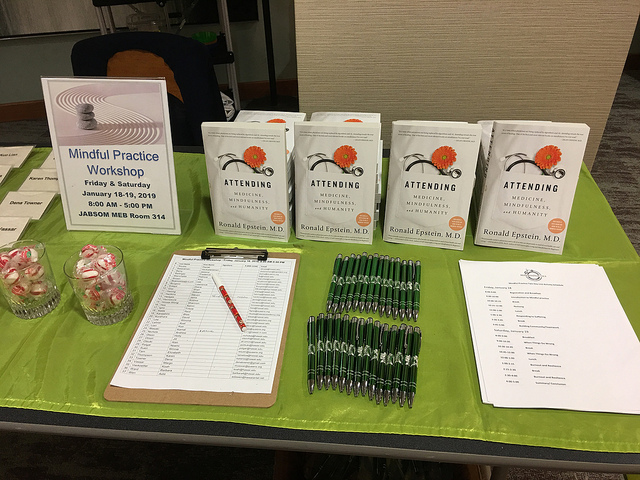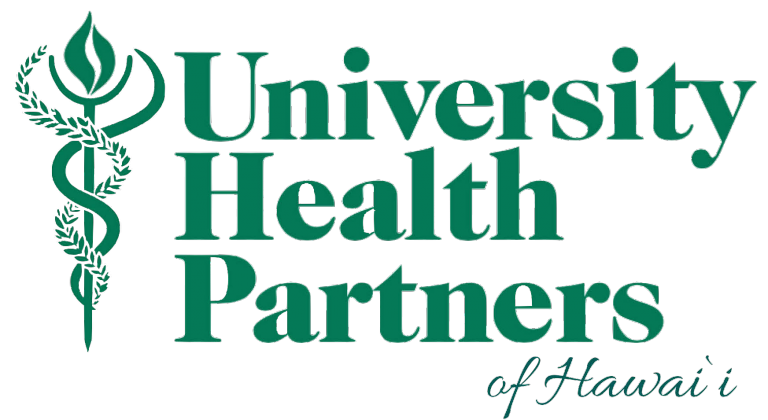February 5, 2019 —
Written by Vina Cristobal
Most doctors in the United States typically work up to 60 hours per week. In between caring patient care, filing documentation, and teaching students and residents, it’s easy for physicians to feel burnout from their work.
In fact, a recent study from the American Medical Association shows that physician burnout is becoming a “public health crisis” that affects the quality of doctor-patient relationships and health care nationwide. A Reuters survey notes, “Close to 44 percent of U.S. physicians are burned out, and 15 percent are depressed and thinking about suicide. . .some physicians are retiring earlier because of burnout or depression.”
To prevent these situations, MindfulPractice — a wellness initiative based out of the University of Rochester Medical Center — hosted a two-day workshop at JABSOM on January 18 and 19. About 30 physicians and healthcare professionals from JABSOM and UHP were in attendance.
 Mindfulness Workshop sign-up table, with copies of Dr. Ronald Epstein’s book, “Attending: Medicine, Mindfulness and Humanity.” Photo courtesy of Crystal Costa.
Mindfulness Workshop sign-up table, with copies of Dr. Ronald Epstein’s book, “Attending: Medicine, Mindfulness and Humanity.” Photo courtesy of Crystal Costa.
The goal of the workshop is to provide healthcare professionals with practical steps to create work-life balance in their careers and to improve the quality of patient care in their respective specialities and practices. MindfulPractice also encourages physicians to share these practices with students and residents to prevent burnout during their educational years.
Attendees participated in interactive webinars, meditation technique training and large group discussions. These activities focused on resilience, responding to suffering and awareness of self and others. Dr. Ron Epstein, keynote speaker and co-director of the MindfulPractice program, also taught attendees to incorporate “beginner’s mind” into their discussions and practical application. Beginner’s mind is a Zen Buddhist technique that helps people to see familiar situations from a new, broader perspective.
“[The work environment] is incredibly important just how the workday is structured and what people do during their day,” Dr. Epstein said. “Most doctors didn’t go to medical school to spend time in front of a computer. They get a sense of meaning and purpose from being with patients. On an individual level, it’s recognizing how to enhance your capacity of being mindful moment to moment during the day by listening more attentively to oneself and listening more attentively to one’s patients and colleagues.”
One of the workshop activities included a ‘deeper dialogue’ with fellow colleagues on positive and negative experiences they’ve had in their practice.
“This is a way of engaging in a deeper way about the impact of those experiences — how they’ve affected us personally, how they’ve affected our practice, and ways of seeing how we might be able to approach them in a more open and positive way,” Dr. Epstein said.
Dr. Richard Szuster, a clinical professor of the JABSOM Department of Psychiatry, was one of the three facilitators for the event. He said he enjoyed seeing the engagement between attendees.
“The highlight was seeing the community engaged, to see physicians and other healthcare professionals engaging in a search for their own meaningfulness in their work,” said Dr. Szuster, who specializes in developing practices of mindfulness for healthcare professionals.
“[Mindfulness] is the foundation for almost everything I do. It’s a way of . . . interacting with colleagues and patients and the ability to engage with our patients in the midst of difficulties and challenges they face. I think it’s something that can almost naturally escape us. In the midst of difficulty, we disengage. This capacity allows us to respond more skillfully in what we’re doing.”
Dr. Epstein and his team have found that these workshops have benefitted physicians in the way they approach their work.
“People see [the workshops] as transformative, and we’ve also published some data showing that it helps physicians develop a sense of well-being and resilience. It helps them be more available to their patients, to listen better, and to feel a sense of community. So we were very energized by those results, and since then, have been developing other programs to try to spread the word to make it more available to more clinicians and teachers.”
Dr. David Kurahara, a clinical faculty of the JABSOM Department of Pediatrics, said that “the mindfulness conference helped me to see that I need to try to enjoy each moment of life that is given to me . . . It helped me to talk about difficult events that have occurred in my life and to have a willing and caring person carefully listen and to provide another person’s perspective that I had never thought about. It provided me a menu toward building an appreciative life and to be thankful for all that has come my way.”
Dr. Diane Eckert, who works in the UHP/JABSOM Department of Psychiatry, added that the seminar was “wonderful.”
“I could feel the calming effects from the practices we engaged in and it really piqued my interest into experiencing the more long term effects of regular practice,” she said. “I am now practicing regularly.” She is also interested in attending another seminar in the future.
Dr. Szuster hopes that the workshop created an interest for participants to consistently apply these practical steps.
“I really do hope that it’s the beginning of something, not the end of something,” he remarked.
“It was great to see people engaged and I hope this keeps an interest, a momentum, a spark for those that attended.”
Featured photo by Dingzeyu Li via Unsplash.



 Mindfulness Workshop sign-up table, with copies of Dr. Ronald Epstein’s book, “Attending: Medicine, Mindfulness and Humanity.” Photo courtesy of Crystal Costa.
Mindfulness Workshop sign-up table, with copies of Dr. Ronald Epstein’s book, “Attending: Medicine, Mindfulness and Humanity.” Photo courtesy of Crystal Costa.